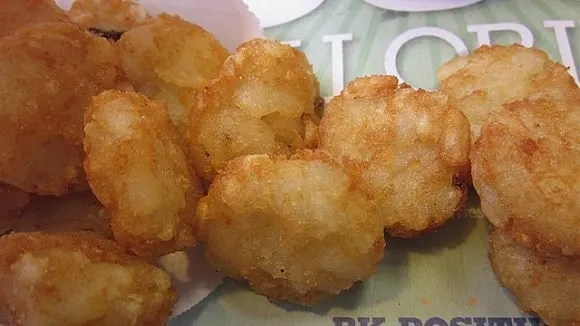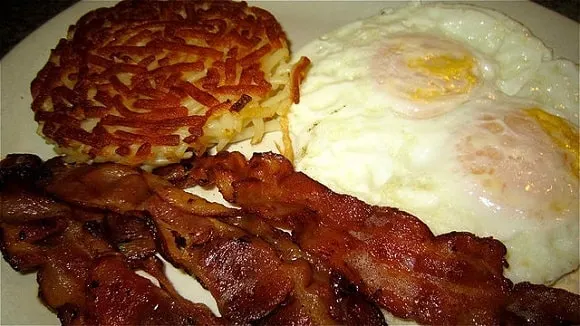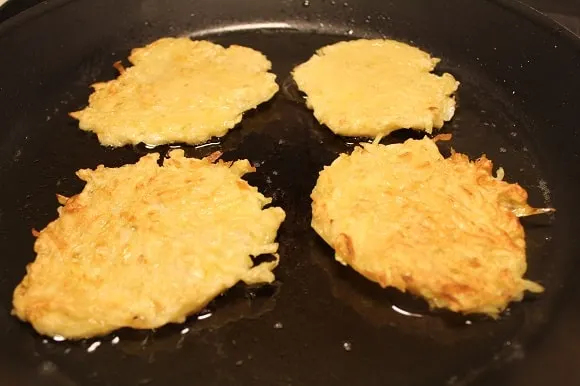Hash browns, the common side dish made from grated potatoes and fried on a griddle or in a pan to a golden brown, are certainly a tasty way to start the morning.
Sometimes called cottage fries or home fries, hash browns are a very popular dish served in many restaurants and home kitchens. I wanted to know how healthy they are and decided to do some research.
Homemade hash browns are generally much healthier than the frozen ones you can buy at the store, as these tend to include much less fat, sodium, and unhealthy additives. You can also serve them with other healthy foods such as salad, vegetables, or eggs.
To learn more about hash browns and how to make them as healthy as possible, all you have to do is keep reading!
Are Hash Browns Considered Healthy?

If prepared the right way and with quality ingredients, homemade hash browns can be considered a fairly healthy dish.
When made at home, you can control what goes into your hash browns.
You can choose to use quality ingredients (organic if you can) and the amount of fat and sodium that go into your browns.
The best and healthiest hash browns are simply made of shredded potatoes seasoned with salt and pepper.
Add an egg, a little flour, and some chopped onion to that, and you got yourself some pretty healthy and tasty hash browns!
Even more so, if you put them in the oven or fry them in virgin olive oil in the pan, instead of frying them in a ton of butter or, even worse, deep-frying them.
Potatoes, the hash browns’ main ingredient, are a good source of Vitamin B6, Vitamin C, and potassium, and even have a little protein in them.
They also don’t have any fat, sodium, or cholesterol and contain modest amounts of carbohydrates.
So, given you are frying them in only a little olive oil and don’t oversalt them, your homemade hash browns are quite the healthy dish!
Of course, the hash browns themselves are only part of the solution (or problem).
What you eat with them will also determine how healthy those browns will be!

If you eat your hash browns with bacon, sausages, ham, cheese, or any other fatty foods, your meal won’t be as healthy as if you choose to have a salad or some lovely, fresh vegetables with your browns!
So, it all depends on how you prepare your food and what types of food you choose to put on your plate.
On the other hand, frozen hash browns are almost always a less-healthy choice. They can contain unhealthy ingredients such as inflammatory seed oils, simple sugars, and preservatives to maintain their color.
Furthermore, they usually contain way more fat, cholesterol, and sodium and have far more calories than homemade browns.
So, if you can, try to stay away from those frozen, store-bought browns and do your own at home!
How Often Should You Eat Hash Browns?
Even though potatoes are considered a healthy vegetable, they are rich in starch, which is a carbohydrate and the reason why potatoes have a high GI (Glycemic Index).
Hence, hash browns must also be considered a high GI food, which means that you shouldn’t eat them every day, as overconsuming this type of food can give you blood sugar issues.
But who eats hash browns daily, right? I mean, I’d definitely grow tired of eating them too often.
And so, if you’re living a moderately healthy lifestyle, there is really nothing wrong with eating hash browns a couple of times a month!
Are Hash Browns Good for Weight Loss?
Whether or not your hash browns are good for weight loss is, once again, determined by what goes into them and by the way you prepare them.
By itself, the average potato contains a relatively low amount of both carbohydrates (26g) and overall calories (110).
And so, if you don’t add a ton of butter or oil to your browns or mix in plenty of shredded cheese, you can keep the number of carbs and calories in your hash browns reasonably low.
Additionally, if you bake them in your oven without using any oil (as 1 tbsp. of olive oil contains around 120 calories), your browns shouldn’t noticeably increase your weight.
Of course, you’ll have to consider the potatoes’ glycemic index, which might prevent you from including hash browns in your GI diet!
As always, it’s a question of balance and amount, isn’t it!?
Are Hash Browns Good for Muscle Gain?

Protein is the essential macronutrient responsible for muscle growth.
The average potato contains around 3g of protein, so it is considered a low-protein food.
The body requires complete proteins for muscle gain, and a complete protein contains a combination of nine essential amino acids.
Potatoes only contain four amino acids.
If you want to ensure you are getting all nine amino acids to gain muscle mass, then you should pair your hash browns with high-protein foods such as:
- Eggs
- Cheese and other dairy products
- Lean meat
- Bacon
- Fish and seafood
- Poultry
Are Hash Browns Bad for Your Cholesterol?

Hash browns contain virtually no cholesterol when baked in the oven or fried in vegetable or seed oil.
This goes for both homemade as well as many popular restaurant hash browns.
When it comes to potatoes and cholesterol, the good news is that eating a diet rich in soluble fibers can help reduce your body’s “bad” cholesterol.
And as potatoes contain both soluble and insoluble fibers, they do a pretty good job managing your cholesterol levels.
So eating foods that contain potatoes, like hash browns, can help reduce the bad cholesterol (trans and saturated fats) your body has picked up from other types of foods. I find that pretty cool!
Are Hash Browns Gluten-Free?

Whether or not hash browns are gluten-free is not always black or white.
When made at home, where you can control the ingredients, the answer is yes; your hash browns are most likely gluten-free if you have used only gluten-free ingredients.
If you are ordering at a restaurant, none of the ingredients may contain gluten, but they are likely cooked on the same griddle as other gluten-containing foods such as bread or sandwiches, pancakes, or French toast.
When buying frozen hash browns, always read the ingredients list – not the nutrition facts – on the back of the package.
Store-bought browns may contain added flour or starches as an anti-caking agent.
If you are struggling with celiac disease or gluten intolerance, you will want to limit your hash brown intake to only those that you have made yourself.
PRO TIP: If you want to enjoy them at a restaurant, make sure always to ask if they are gluten-free. While they are certainly delicious, they are not worth risking your health over them!

